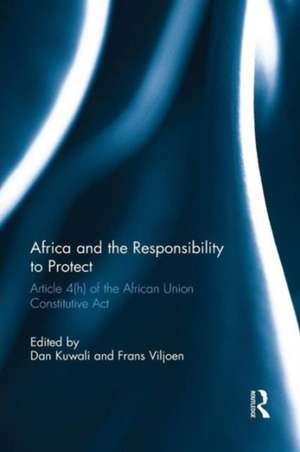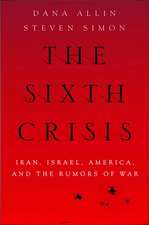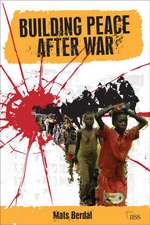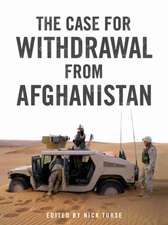Africa and the Responsibility to Protect: Article 4(h) of the African Union Constitutive Act
Editat de Dan Kuwali, Frans Viljoenen Limba Engleză Paperback – 3 mar 2016
This book brings together experts in the field to explore the potential application of Article 4(h), and the complexities that may explain its non-invocation so far. Although Article 4(h) is noble in purpose, its implementation faces several legal and policy challenges given that the use of force penetrates the principles of state sovereignty and non-intervention – the very cornerstones upon which the AU is founded. This book considers these issues, as well as the need to reconcile Article 4(h), in so far as it allows the AU to exercise military intervention to protect populations at risk of mass atrocities, with the provisions of the Charter of the United Nations.
Drawing from the insights of law, political science, diplomacy and military strategy, the book offers a unique combination of multi-disciplinary expertise that harnesses the views of a diverse group of authors, focused on the legal, policy, and practical insights on the implementation of Article 4(h) and the responsibility to protect in Africa in order to provide concrete recommendations on how to end mass atrocities on the continent
| Toate formatele și edițiile | Preț | Express |
|---|---|---|
| Paperback (1) | 416.22 lei 6-8 săpt. | |
| Taylor & Francis – 3 mar 2016 | 416.22 lei 6-8 săpt. | |
| Hardback (1) | 1180.23 lei 6-8 săpt. | |
| Taylor & Francis – 29 noi 2013 | 1180.23 lei 6-8 săpt. |
Preț: 416.22 lei
Nou
Puncte Express: 624
Preț estimativ în valută:
79.68€ • 81.99$ • 67.17£
79.68€ • 81.99$ • 67.17£
Carte tipărită la comandă
Livrare economică 01-15 martie
Preluare comenzi: 021 569.72.76
Specificații
ISBN-13: 9781138659186
ISBN-10: 1138659185
Pagini: 452
Ilustrații: black & white illustrations
Dimensiuni: 156 x 234 x 22 mm
Greutate: 0.45 kg
Ediția:1
Editura: Taylor & Francis
Colecția Routledge
Locul publicării:Oxford, United Kingdom
ISBN-10: 1138659185
Pagini: 452
Ilustrații: black & white illustrations
Dimensiuni: 156 x 234 x 22 mm
Greutate: 0.45 kg
Ediția:1
Editura: Taylor & Francis
Colecția Routledge
Locul publicării:Oxford, United Kingdom
Public țintă
PostgraduateCuprins
Part 1: Introduction Foreword, Justice Richard Goldstone Introduction, Dan Kuwali and Frans Viljoen Part 2: Conceptual Issues 1. The Rationale of Article 4(h), Dan Kuwali 2.What is ‘intervention’ under Article 4(h)?, Dan Kuwali 3. Calibrating the Conceptual Contours of Article 4(h), Ademola Abass 4. The Role of the UN Security Council in the Implementation of Article 4(h), Martin Kunschak 5. The International Crimes that Trigger Article 4(h)-intervention, Martin Kunschak 6. Interpreting and Implementing Article 4(h) from Ethical Perspectives, Brian D. Lepard 7. Article 4(h) and the Citizen's Right to be Protected, Jan Mutton 8. Article 4(h) Intervention: Prospects and problems, Francis Kofi Abiew Part 3: Institutional Perspectives 9. Article 4(h): A Supernational perspective, Babatunde Fagbayibo 10. The Role of the African Peace and Security Architecture in Implementation of Article 4(h), Tim Murithi 11. The Role of the African Union Continental Early Warning System in Preventing Mass Atrocities, John Mark Iyi 12. The Role of the African Standby Force in Implementing Article 4(h), Charles T. Hunt Part 4. Preventing Mechanisms 13. The Role of the African Human Rights System in Preventing Mass Atrocities, Solomon A. Dersso 14. The role of the African Peer Review Mechanism in preventing mass atrocities, Thembani Mbadlanyana 15. Article 4(h): Advancing the states' capacity to protect and prevent atrocities, Rachel Gerber 16. The Role of the Special Procedures and Other Measures of the UN Human Rights Council in Preventing Mass Atrocities in Africa, Christine Evans and Jane Connors Part 5. Operationalization 17. Drawing Lessons from ECOWAS for Implementing Article 4(h) Intervention, Bright Nkrumah and Frans Viljoen 18. Multilateral Intervention: The AMISOM Experience, Gilbert Mittawa and Fred Mugisha 19. Article 4(h): Translating Politcal Commitment into Collective Action, Frank Okyere, Kwesi Aning and Susan Nelson 20. Mobilizing the Political Will for Article 4(h)-Intervention, Madalisto Z. Phiri and Blaise G. Saenda 21. Article 4(h): Generating the Capability to Protect Populations from Mass Atrocities in Africa, Henry L. Odillo 22. Ensuring Responsibility While Implementing Article 4(h), Noel M. Morada 23. Supporting African Solutions to African Problems: IBSA and the implementation of Article 4(h), Naomi Kikoker Part 6: Conclusions 24. Conclusion, Dan Kuwali and Frans Viljoen 25. The Pretoria Principles: A Commentary, Dan Kuwali and Frans Viljoen
Descriere
The African Union is the only intergovernmental organization to make the responsibility to protect part of its foundational text Article 4(h) of its Constitutive Act. Although interventions have occurred since the Constitutive Act came into force the AU Assembly has not invoked Article 4(h) explicitly. This book explores the potential application of this provision and the legal and policy challenges implementation faces, given that the use of force penetrates the principles of state sovereignty and non-intervention, cornerstones upon which the AU is founded. The book brings together experts in the field to analyse the legal, policy and practical aspects of implementing Article 4(h).













